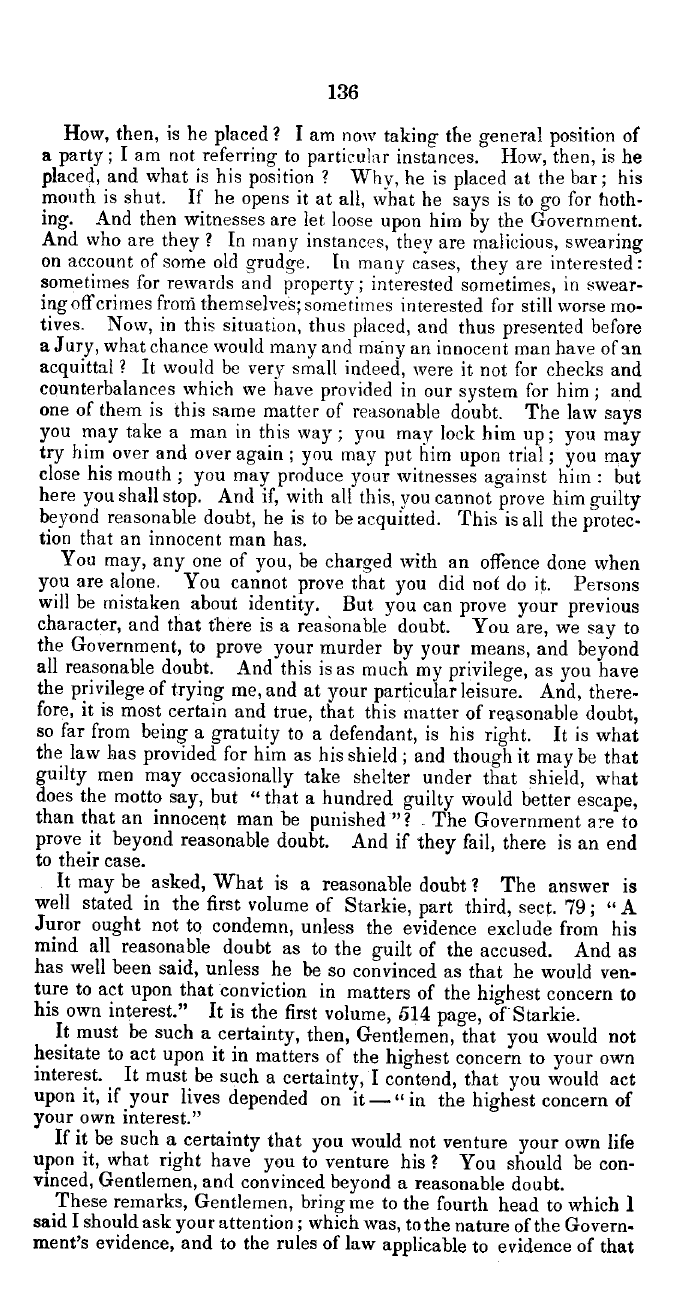|
136
How, then, is be placed? I am now taking the general position of
a party; I am not referring to particular instances. How, then, is he
placed, and what is his position ? Whv, he is placed at the bar; his
mouth is shut. If he opens it at all, what he says is to go for Noth-
ing. And then witnesses are let, loose upon him by the Government.
And who are they ? In many instances, they are malicious, swearing
on account of some old grudge. In many cases, they are interested:
sometimes for rewards and property; interested sometimes, in swear-
ingofcrimes from themselves; sometimes interested for still worse mo-
tives. Now, in this situation, thus placed, and thus presented before
a Jury, what chance would many and many an innocent man have of an
acquittal ? It would be very small indeed, were it not for checks and
counterbalances which we have provided in our system for him ; and
one of them is this same matter of reasonable doubt. The law says
you may take a man in this way; you may lock him up; you may
try him over and over again; you may put him upon trial; you may
close his mouth ; you may produce your witnesses against him : but
here you shall stop. And if, with all this, you cannot prove him guilty
beyond reasonable doubt, he is to be acquitted. This is all the protec-
tion that an innocent man has.
You may, any one of you, be charged with an offence done when
you are alone. You cannot prove that you did not do it. Persons
will be mistaken about identity. , But you can prove your previous
character, and that there is a reasonable doubt. You are, we say to
the Government, to prove your murder by your means, and beyond
all reasonable doubt. And this is as much my privilege, as you have
the privilege of trying me, and at your particular leisure. And, there-
fore, it is most certain and true, that this matter of reasonable doubt,
so far from being a gratuity to a defendant, is his right. It is what
the law has provided for him as his shield; and though it may be that
guilty men may occasionally take shelter under that shield, what
does the motto say, but °° that a hundred guilty would better escape,
than that an innocent man be punished "? _ The Government are to
prove it beyond reasonable doubt. And if they fail, there is an end
to their case.
It may be asked, What is a reasonable doubt ? The answer is
well stated in the first volume of Starkie, part third, sect. 79; °'A
Juror ought not to condemn, unless the evidence exclude from his
mind all reasonable doubt as to the guilt of the accused. And as
has well been said, unless he be so convinced as that he would ven-
ture to act upon that conviction in matters of the highest concern to
his own interest." It is the first volume, 514 page, of Starkie.
It must be such a certainty, then, Gentlemen, that you would not
hesitate to act upon it in matters of the highest concern to your own
interest. It must be such a certainty, I contend, that you would act
upon it, if your lives depended on it-°° in the highest concern of
your own interest."
If it be such a certainty that you would not venture your own life
upon it, what right have you to venture his ? You should be con-
vinced, Gentlemen, and convinced beyond a reasonable doubt.
These remarks, Gentlemen, bring me to the fourth head to which 1
said I should ask your attention; which was, to the nature of the Govern-
ment's evidence, and to the rules of law applicable to evidence of that
|

